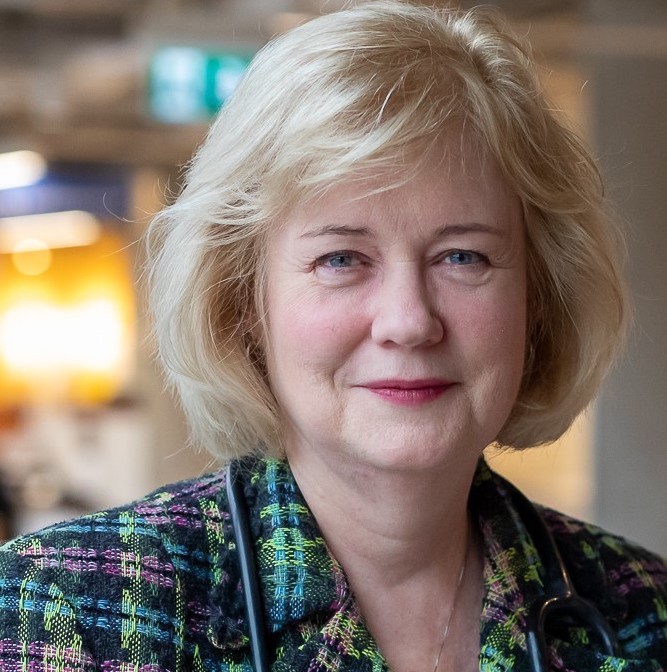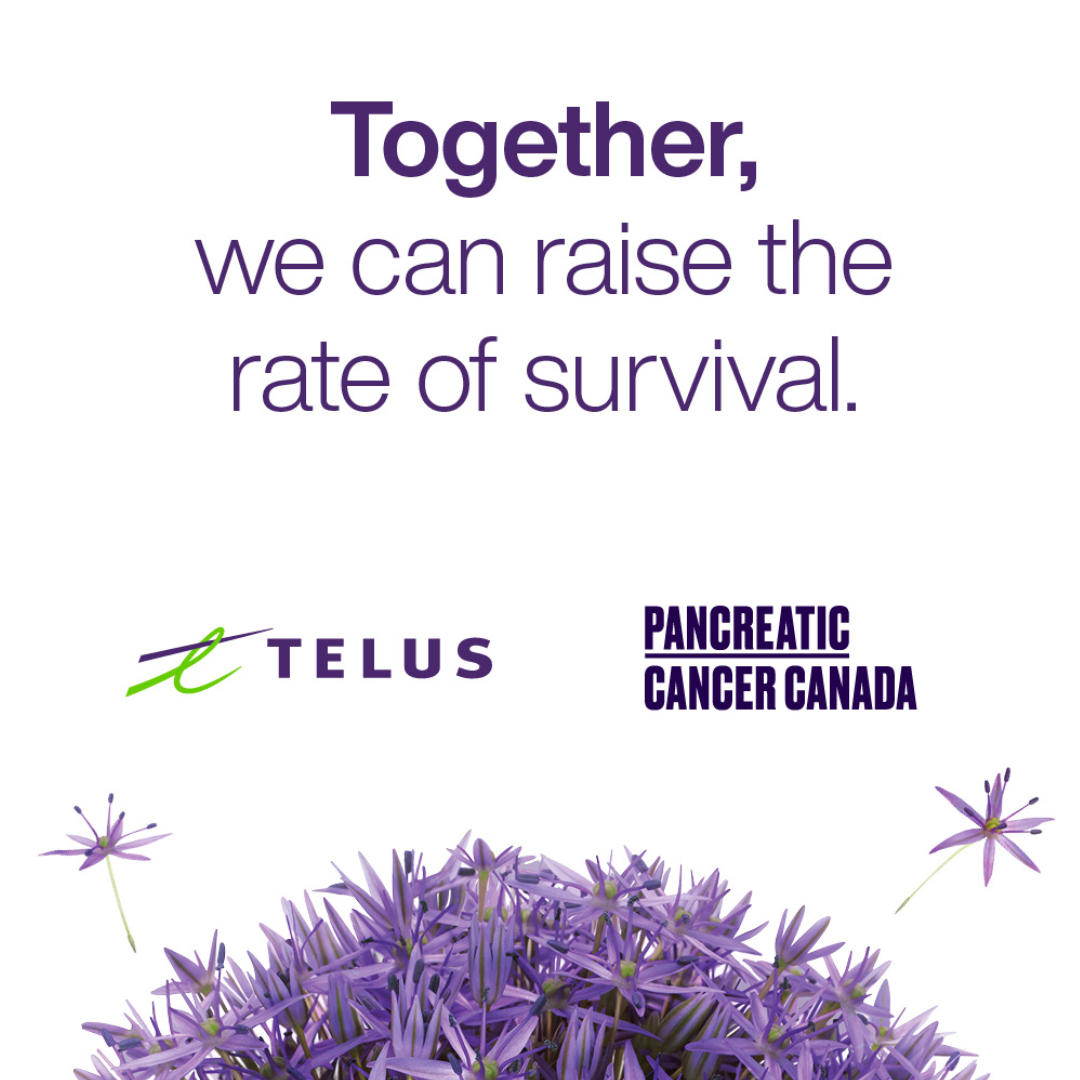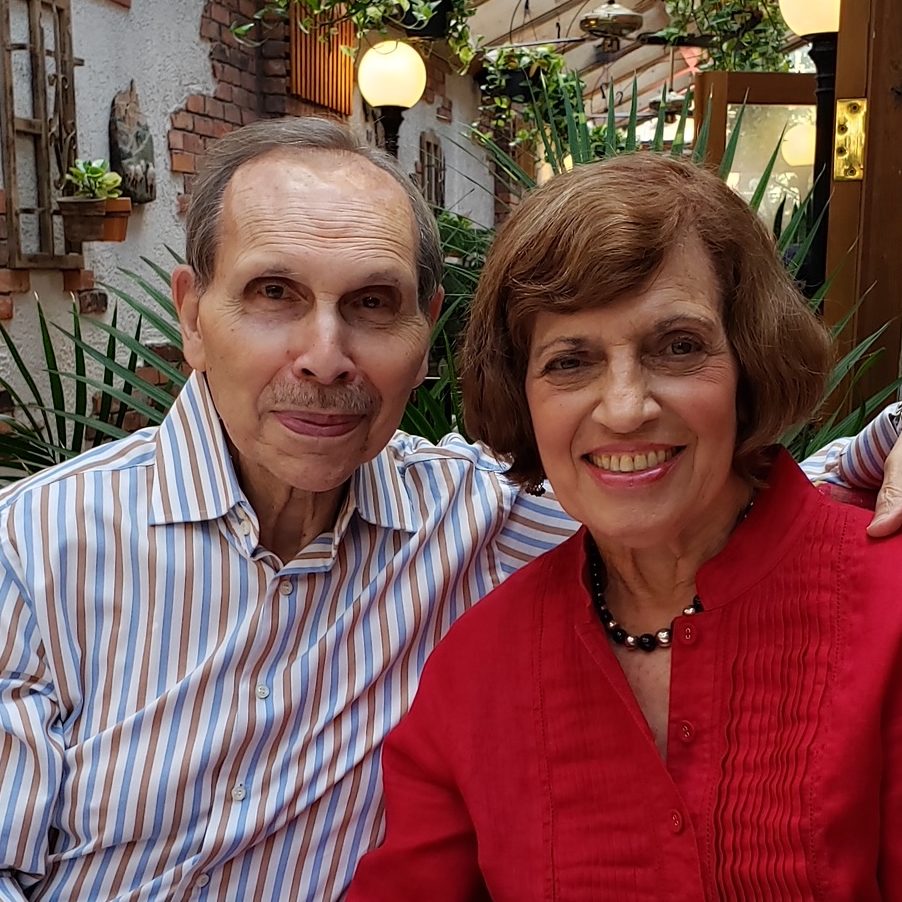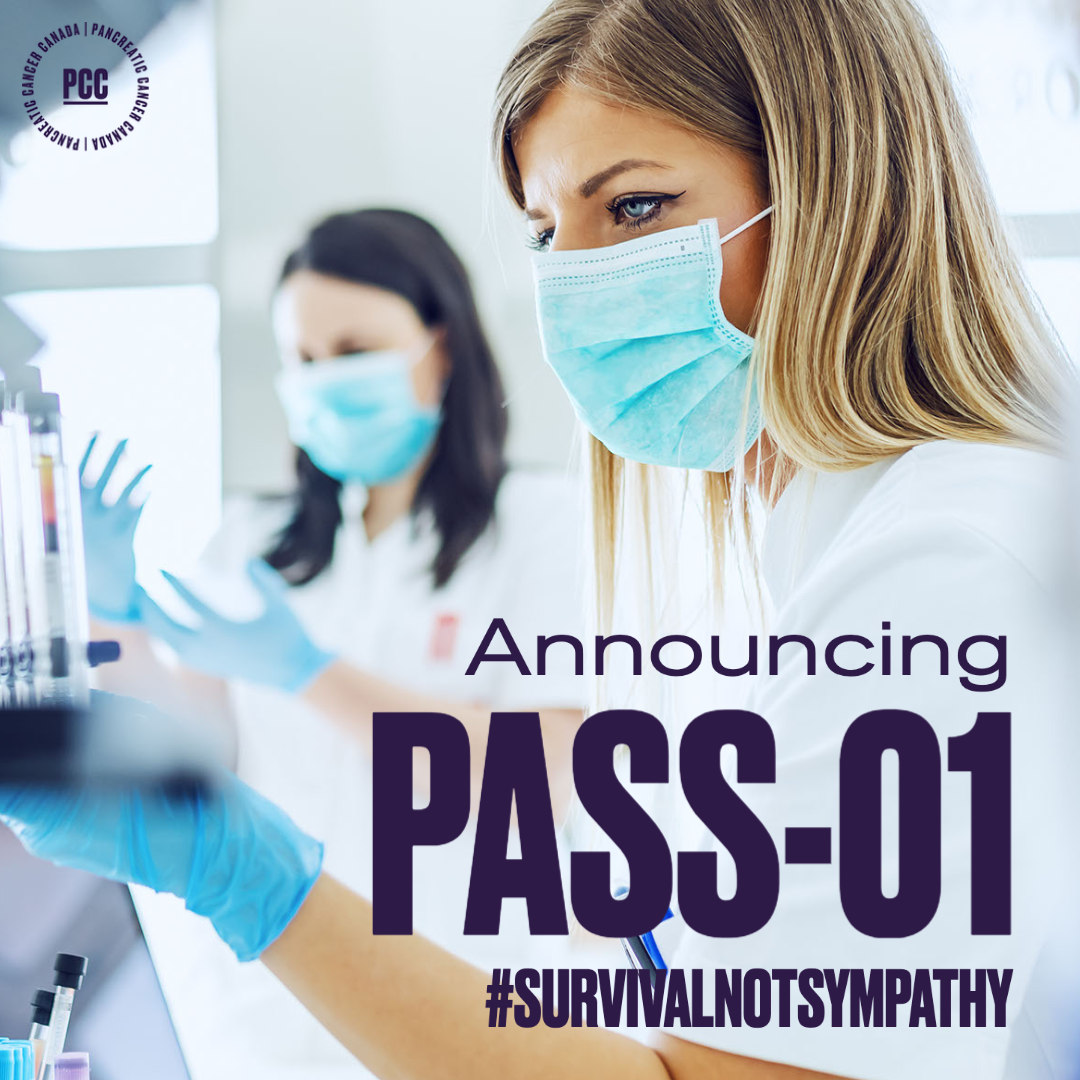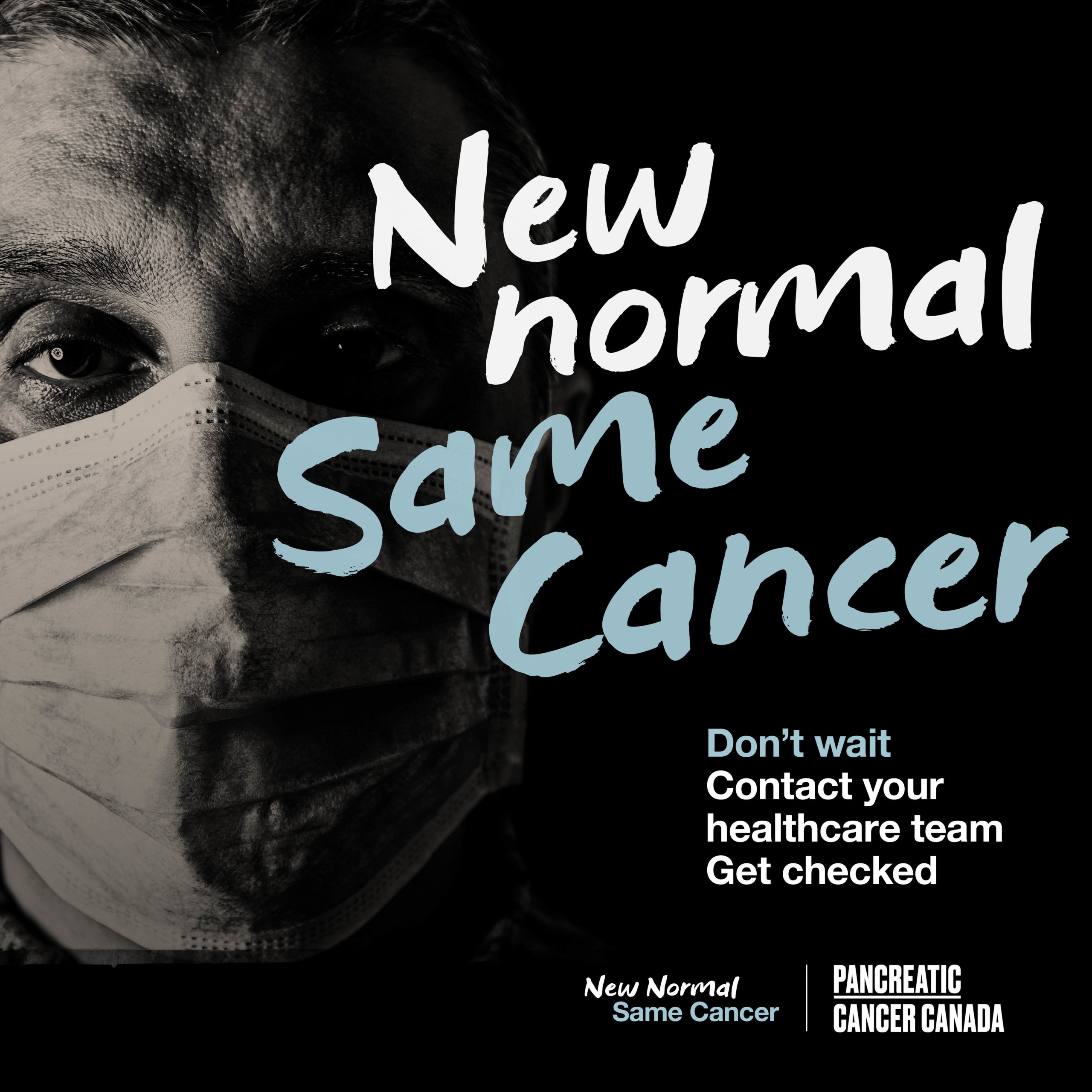For the most optimal viewing experience, please consider reading our Impact Report on a desktop computer.


TOGETHER WE persevered
Like many Canadian organizations, we entered 2021 with lessons and insights from 2020: we were more resourceful, found strength in the nimble nature of our organization, and looked for ways to increase support and engagement among patients and caregivers. The most vulnerable people in our community spent more time isolated from their loved ones, but we ensured they were never truly alone — we were there to answer questions, provide support and reassurance, and create a virtual community stronger than ever before.
When we reflect on 2021 — a year that was once again characterized by uncertainty in an ever-shifting global landscape — one word keeps coming to mind: perseverance.
Perseverance is what we saw from patients who advocated for their diagnosis and often had to go through treatments alone because of Covid-19 safety measures. It is what we heard in the voices of caregivers, who managed appointments, researched treatment options, and advocated for better patient care, while carrying unimaginable stress and worry compounded by the pandemic. Our community fundraisers persevered, many of whom have lost loved ones to this disease, motivated to find new and accessible ways to support desperately needed research.
In 2021 we were inspired, as we always are, by the innumerable members of our community who never lost focus of our collective goal: to raise the rate of survival and improve quality of life for pancreatic cancer patients.
And so, with the expertise of our staff, the support of our board of directors, the brilliance of world-renowned researchers, and the many generous volunteers and donors who stand with us year over year, we persevered.
We persevered because we have been called to fight the world’s toughest cancer.
We persevered because that’s what thousands of pancreatic cancer patients across Canada do every day.
We persevered because of you.
Together, this is our impact.



OUR IMPACT 2021
TOGETHER WE persevered
Like many Canadian organizations, we entered 2021 with lessons and insights from 2020: we were more resourceful, found strength in the nimble nature of our organization, and looked for ways to increase support and engagement among patients and caregivers. The most vulnerable people in our community spent more time isolated from their loved ones, but we ensured they were never truly alone — we were there to answer questions, provide support and reassurance, and create a virtual community stronger than ever before.
When we reflect on 2021 — a year that was once again characterized by uncertainty in an ever-shifting global landscape — one word keeps coming to mind: perseverance.
Perseverance is what we saw from patients who advocated for their diagnosis and often had to go through treatments alone because of Covid-19 safety measures. It is what we heard in the voices of caregivers, who managed appointments, researched treatment options, and advocated for better patient care, while carrying unimaginable stress and worry compounded by the pandemic. Our community fundraisers persevered, many of whom have lost loved ones to this disease, motivated to find new and accessible ways to support desperately needed research.
In 2021 we were inspired, as we always are, by the innumerable members of our community who never lost focus of our collective goal: to raise the rate of survival and improve quality of life for pancreatic cancer patients.
And so, with the expertise of our staff, the support of our board of directors, the brilliance of world-renowned researchers, and the many generous volunteers and donors who stand with us year over year, we persevered.
We persevered because we have been called to fight the world’s toughest cancer.
We persevered because that’s what thousands of pancreatic cancer patients across Canada do every day.
We persevered because of you.
Together, this is our impact.
OUR FUNDING PRIORITIES
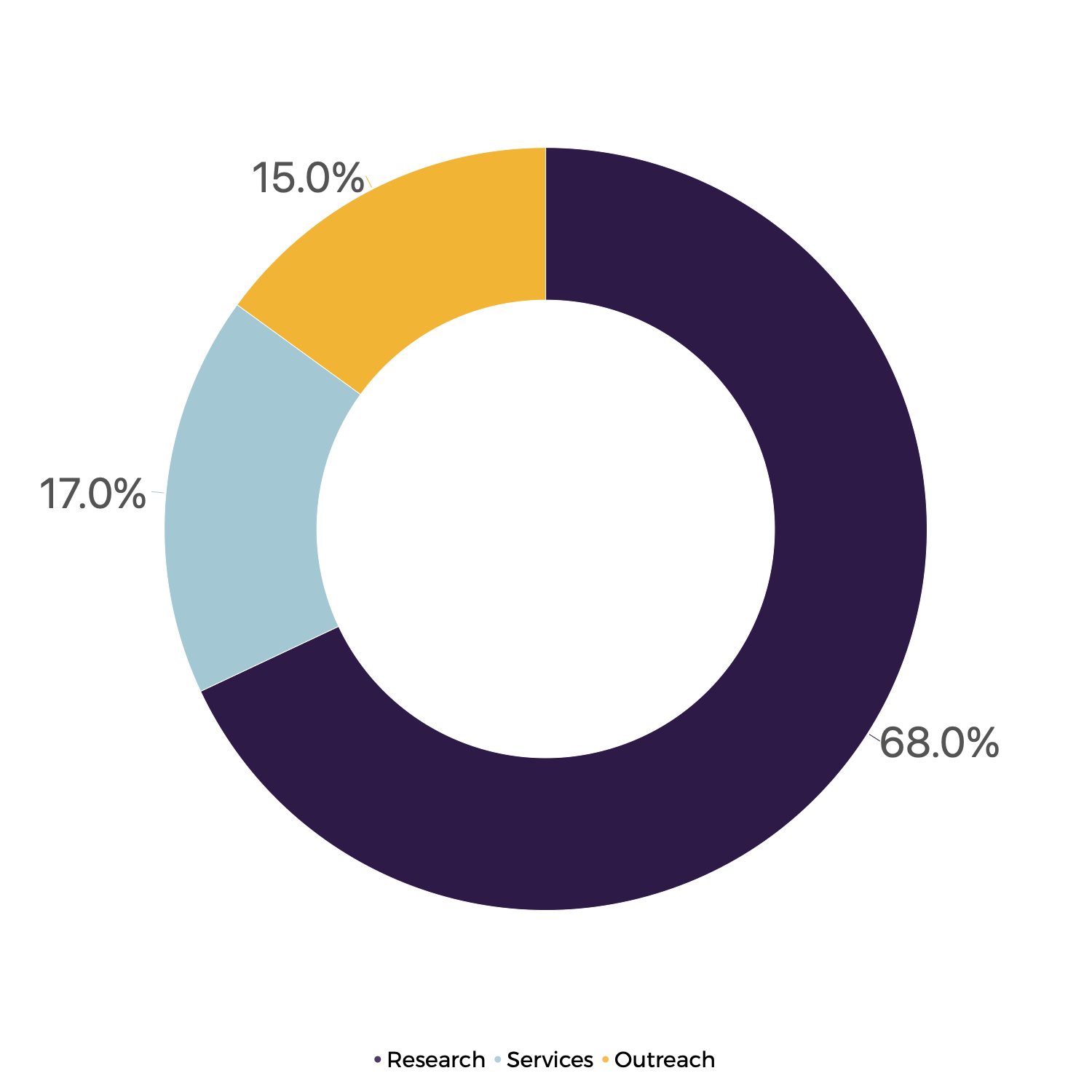


Research (68%) – As researchers found safe ways to return to the lab and treat patients, we were able to resume our planned research investments, which once again became our most urgent funding priority. In fact, we were thrilled to launch an international clinical trial in collaboration with eight of the most esteemed cancer research centres in North America despite the interruptions the pandemic was still causing.
Programs and Services (17%) – Since 2019 we’ve seen the demand for virtual support services double year over year. As patients, caregivers, and those bereaved by pancreatic cancer needed information and support, our free Ask An Expert and Peer Support programs were there to answer the call with increased capacity and reach.
Awareness & Outreach (15%) – Our digital lives have been deepening in recent years, and in 2021 we reinvested in critical campaigns and strengthened bonds with allied organizations, while finding new ways to spread awareness. Through the launch of our podcast and a survey designed to learn more about the gaps for patients and caregivers at end of life, we shared important information with our community and listened to the stories of those whose experiences will help us drive greater impact for families affected by pancreatic cancer in the future.
OUR FUNDING PRIORITIES



Research (68%) – As researchers found safe ways to return to the lab and treat patients, we were able to resume our planned research investments, which once again became our most urgent funding priority. In fact, we were thrilled to launch an international clinical trial in collaboration with eight of the most esteemed cancer research centres in North America despite the interruptions the pandemic was still causing.
Programs and Services (17%) – Since 2019 we’ve seen the demand for virtual support services double year over year. As patients, caregivers, and those bereaved by pancreatic cancer needed information and support, our free Ask An Expert and Peer Support programs were there to answer the call with increased capacity and reach.
Awareness & Outreach (15%) – Our digital lives have been deepening in recent years, and in 2021 we reinvested in critical campaigns and strengthened bonds with allied organizations, while finding new ways to spread awareness. Through the launch of our podcast and a survey designed to learn more about the gaps for patients and caregivers at end of life, we shared important information with our community and listened to the stories of those whose experiences will help us drive greater impact for families affected by pancreatic cancer in the future.
The Change-Makers
One of the most remarkable things about our community is the number of people, organizations, and partners who go above and beyond to advance our shared mission. In 2021, champions of pancreatic cancer research and specialized programs came forward to help us increase momentum in a continually uncertain time. Below, we invite you to meet a few of the many generous donors, advocates, researchers, and organizations who shared their gifts of time, talent, and treasure with our community over the course of the year.
Research
RESEARCH
Together with renowned scientists, we championed the return of groundbreaking research for pancreatic cancer patients. We were thrilled that researchers persevered to find safe ways for patients to participate in life-altering clinical trials amid the uncertainty of the ongoing pandemic. Research is critical — not just to improve patient outcomes in the future, but as a means of offering alternative, potentially life-lengthening treatments to patients today.
Research
PASS-01
New Clinical Trial Launched
This groundbreaking clinical trial involves the collaboration of eight prestigious cancer research centres in the US and Canada; including Princess Margaret Hospital, The Johns Hopkins Hospital, Memorial Sloan Kettering Cancer Centre, Dana Farber Cancer Institute, Cold Spring Harbor Laboratory, Northwell Health, the Ontario Institute for Cancer Research, and BC Cancer Agency. PASS-01 uses revolutionary organoid technology to personalize treatment options for advanced pancreatic cancer patients, enabling researchers to test multiple novel therapies on a patient’s tumour cells to see which treatment would have the greatest chance at being effective. By studying a potential biomarker called GATA6 and tumour subtypes that were previously identified in the PCC funded COMPASS trial, researchers can better understand the variations seen across different pancreatic cancer cases. This means more personalized — and effective — treatment options; something urgently needed to give patients a greater chance at a longer life.
2021 marks the second year of a three year funding commitment to this project. PASS-01 is a Stand Up To Cancer Dream Team funded by the Pancreatic Cancer Collective, an initiative of the Lustgarten Foundation and Stand Up To Cancer® (SU2C), SU2C Canada and Pancreatic Cancer Canada.
Patients to be enrolled
Participating Research Centres
Kernls
In 2021 we began a partnership with Kernls: a web-based platform where project Champions match donations made to PASS-01 and receive an inside look at how research progress is made. Our Champions and greater PCC community went above and beyond to help us fund this innovative project, raising over $209,000 in just six weeks. To offer donors and Champions special insight into early findings of PASS-01, Kernls Founder and CEO Mike Haughton spoke to Primary Investigator Dr. Jennifer Knox about the project. Hear her update in the video at left.
NeoPancONE
One critical element that sets NeoPancONE apart from other neoadjuvant trials is the study of a potential biomarker called GATA6, which was discovered during our earlier investments in the COMPASS trial. Researchers are measuring GATA6 in relation to a patient’s response to treatment to discern if this course is more effective for some patients than others based on their genetic make-up.
2021 marked the second year in a three-year investment in this important clinical trial.
Participating Cancer Centres
Patients to be Enrolled
HERO-Pancreas
This revolutionary study uses wearable technology to collect and track real-time bio-medical data from patients to further our understanding of this disease and see if the body gives a signal at the first sign of progression. These devices not only track responsiveness to treatment, but also provide more in-depth analysis of the patient’s physical and psychological experience, such as their heart and respiratory rate, body temperature, sleep patterns, and activity levels. Patients can also log qualitative data, like changes in mood, in a specialized app.
The data generated from this project will be shared in a repository that promotes open science, allowing scientists around the world to access the information for use in other studies. By sharing this information with the global research community, we will learn even more about this disease, treat it better and ultimately save more lives quicker and on a larger scale.
HERO-Pancreas is a feasibility study with 60 patients. Those participating in the NeoPancONE trial at Princess Margaret Cancer Centre are automatically eligible to be part of HERO-Pancreas. 2021 was our first year funding HERO-Pancreas, and we are excited for the findings to be utilized on a global scale and inspire further research.
Support
serviceS
SUPPORT
SERVICES
In 2021, support services remained a lifeline for patients, caregivers, and those bereaved by pancreatic cancer from small towns like Digby, Nova Scotia to urban centres like Calgary and Vancouver. From our Peer Support program with the cancer care experts at Wellspring to our Ask An Expert service, members of our community from coast to coast were able to access information and support free of charge and from the safety and comfort of their homes.
support services
In 2021, support services remained a lifeline for patients, caregivers, and those bereaved by pancreatic cancer from small towns like Digby, Nova Scotia to urban centres like Calgary and Vancouver. From our Peer Support program with the cancer care experts at Wellspring to our Ask An Expert service, members of our community from coast to coast were able to access information and support free of charge and from the safety and comfort of their homes.
Peer Support
In 2021 we saw a 22% increase in individuals served, as well as a 79% increase in appointments. The demand for short-term counselling rose by 16% as well, signalling the critical importance of this program for the mental health of our community. The ability to access peer support, counselling, group support, and resources virtually has been a balm to patients and caregivers from coast to coast.
Peer Support Participant Demographics
- Patients 45%
- Caregivers 39%
- The Bereaved 16%
Peer Support
Peer Support is the welcome point for our free programs with Wellspring. When a participant reaches out, they are matched with a highly-trained volunteer whose personal experience with this disease is as close as possible to the experience of the participant.
Short-Term Counselling
When someone from our community needs a little extra support, they are connected with a professional counsellor from Wellspring as part of our Short-Term Counselling service, entirely free of charge.
Ongoing Impact
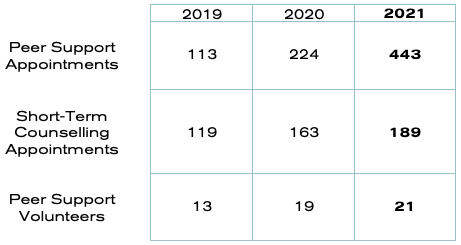

Ask An Expert
In 2021, 91% of inquiries came from new participants, with a 200% increase in requests compared to our short-term pilot program in 2020. Patients and caregivers from small rural communities to bustling urban centres engaged with our program seeking support on topics such as treatment options, clinical trials and genetic testing. Support for this program has been made possible by the thoughtfully directed donations of our donors.
Common Question Topics
- Treatment Options 42%
- Diagnosis 22%
- Clinical Trials 15%
- Genetic Testing 11%
- Diet and Nutrition 10%
AWARENESS
& OUTREACH
AWARENESS &
OUTREACH
As we relied on the digital sphere to seek information and stay connected, it became increasingly important to find innovative, accessible, and attention-grabbing ways to reach out to our community and the Canadian public.
AWARENESS AND OUTREACH
As we relied on the digital sphere to seek information and stay connected, it became increasingly important to find innovative, accessible, and attention-grabbing ways to reach out to our community and the Canadian public.
New Normal, Same Cancer
The New Normal, Same Cancer initiative was created in response to a startling statistic in early 2020: it was estimated that cancer diagnoses had declined by 40% globally, primarily due to cancelled or delayed appointments and an understandable hesitancy from patients to go the doctor with the threat of Covid-19 looming.
In recognition of World Cancer Day on February 4th, we worked together with dozens of cancer charities and allied organizations from across the country to encourage Canadians to reach out to their healthcare team with their concerns. Cancer doesn’t wait, so when it comes to personal health, neither should you.
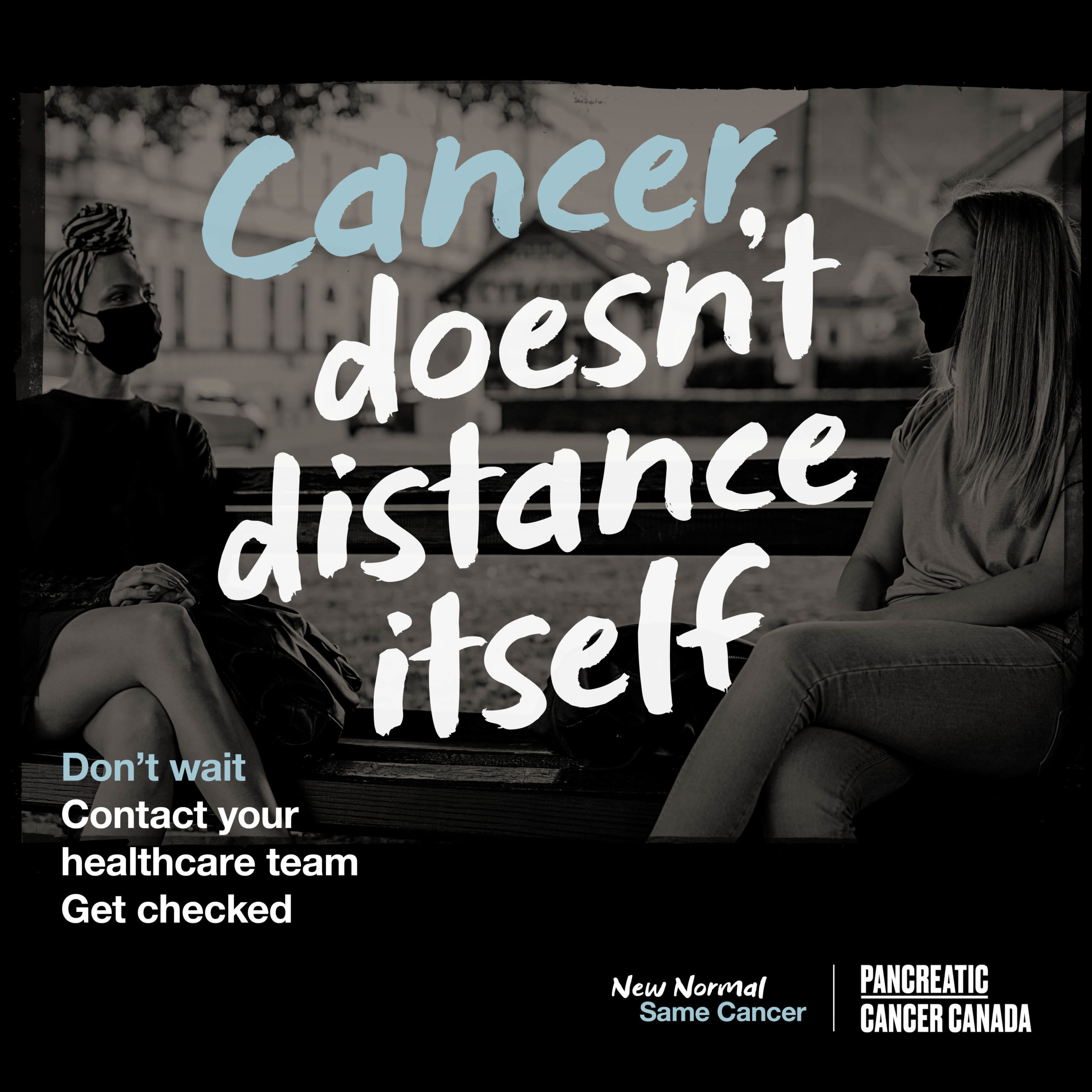

Awareness and Outreach Initiatives
End-Stage Cancer Survey
Click here to learn more and respond to the survey.
The Stage II Project
Click here to read through The Stage II Project.
People need to understand what it is to ‘hope’. ‘Hope’ is something that must be fluid and ever-changing. Hope isn’t just about the person miraculously being cured, hope can also mean a good death with pain managed through palliative care. I am proud to say that my dad had a good death.
Allied Organizations
World Pancreatic Cancer Coalition
Union for International Cancer Control (UICC)
UNAPOLOGETIC: The PCC Podcast
The first episode featured a fire-side chat with our Chief Executive Officer Michelle Capobianco and Board Chair Dr. Anish Kirpalani, who described the origins of the organization, how it has evolved over the years, and the progress that is on the horizon.
Look for the first full season of UNAPOLOGETIC in the fall of 2022.
“I had the misfortune of having any radiologist’s worst nightmare come true:
I diagnosed my own mom with pancreatic cancer.”
– Dr. Anish Kirpalani, PCC Board Chair 2018-2022
UNAPOLOGETIC Episode 1
“I had the misfortune of having any radiologist’s worst nightmare come true:
I diagnosed my own mom with pancreatic cancer.”
– Dr. Anish Kirpalani, PCC Board Chair 2018-2022
UNAPOLOGETIC Episode 1
“I had the misfortune of having any radiologist’s worst nightmare come true:
I diagnosed my own mom with pancreatic cancer.”
– Dr. Anish Kirpalani, PCC Board Chair 2018-2022
UNAPOLOGETIC Episode 1
IN THE NEWS
Thank yoU
THANK
YOU
We could not have persevered through another uncertain and challenging year without the unwavering support of our community. From donors and sponsors to our incredible board of directors to the hundreds of patients, caregivers and family members we connected with, every interaction and every dollar has helped us make the progress you have read about today. With the strength and dedication of our community, we have set the stage for critical advancements in research, services, and awareness. Together we will continue to persevere to meaningfully raise the survival rate of this disease.
Thank you for your enduring support.
Thank you
We could not have persevered through another uncertain and challenging year without the unwavering support of our community. From donors and sponsors to our incredible board of directors to the hundreds of patients, caregivers and family members we connected with, every interaction and every dollar has helped us make the progress you have read about today. With the strength and dedication of our community, we have set the stage for critical advancements in research, services, and awareness. Together we will continue to persevere to meaningfully raise the survival rate of this disease.
Thank you for your enduring support.
We want to hear from you
Get In Touch
Toronto, ON M2P 2A9
Toll Free: 1-888-726-2269
info@pccf.ca
Charitable Registration Number 84870 1967 RR0001
Follow Us
subscribe to our newsletter
The survival
guide


316-4211 Yonge Street
Toronto, ON M2P 2A9
Toll Free: 1-888-726-2269
info@pancreaticcancercanada.ca
Charitable Registration Number 84870 1967 RR0001

